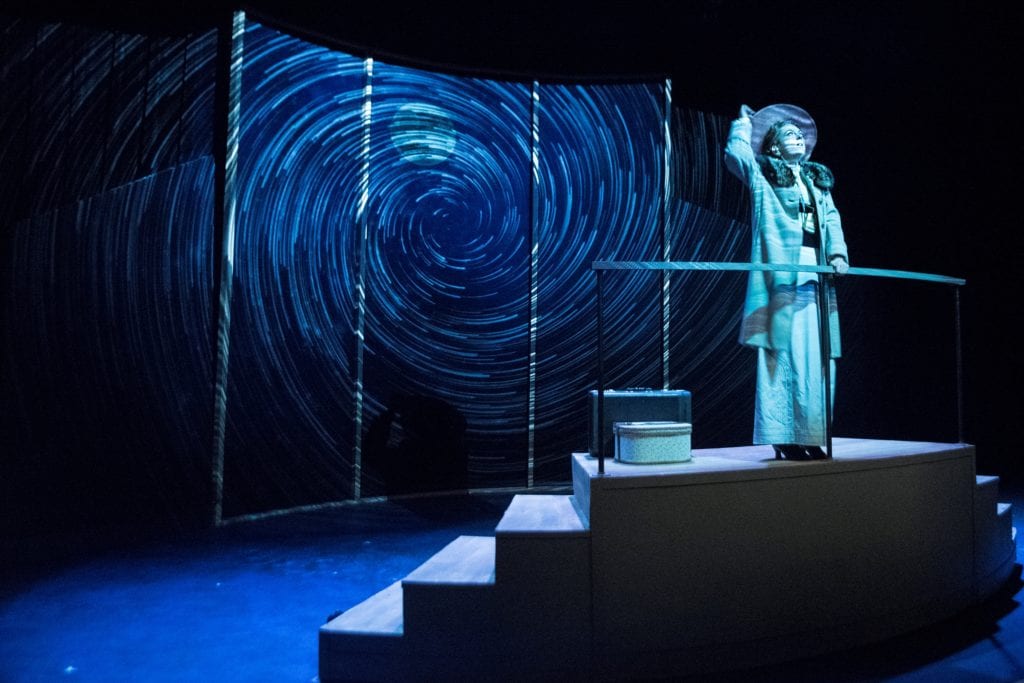
By Gabrielle DeCristofaro (Read the original.)
On the night of Friday April 14 at The Dairy Center for the Arts, the Boulder Ensemble Theatre Company (BETC) organized a special treat allowing playwright Lauren Gunderson to connect with the audience of her play “Silent Sky” in the Grace Gamm Theater for a live Skype interview. Gunderson’s work is certainly no stranger to The Dairy. Her play dealing with women in the wide range of American political perspectives, “The Taming”, was performed last year in the Carsen Theater.
Gunderson, who was recently named the most produced living playwright in America, is known for her narratives that combine strong women with the sciences. The regional premiere of “Silent Sky”, directed by Kate Folkins and presented by the BETC tells a true story of Henrietta Leavitt (Anastasia Davidson), a mathematician from Wisconsin that gets hired to work at the Harvard Observatory where she makes discoveries in the cosmos that lead to many epiphanies in the astronomy community despite cultural adversities.
Taking place in the late 19th and early 20th centuries, “Silent Sky” delves into themes still relevant today such as science versus theology, women’s rights, and the ways in which women are expected to behave in society, such as how they are to dress, and their roles in the work environment. Consistent with these themes, it’s revealed that Henrietta is paid 25 cents an hour to do her job. Even more challenging, she has to use her dowry to get to Harvard. At a time when an Oscar-nominated movie like Hidden Figures has just come out, the production of this play is fitting perfectly with today’s paradigm.
Henrietta’s relationship with her sister, Margaret (Rachel Turner), is a reflection of women’s roles that were common in 1908. Whereas Henrietta is engaged in the sciences and expresses independent tendencies, her sister is more domestic, and a firm believer in God and Christianity. Before leaving home to pursue her career at Harvard, Henrietta says to Margaret, while looking up into the sky, “We look in the same direction, but our understanding is distinct.”
Another distinct way in which women’s roles are clearly defined during this time period is in the workplace. Although Henrietta is hired for her exceptional skill as a mathematician, she and her colleagues, Annie (Karen LaMoureaux) and Willamina (Leslie O’Carroll), are given a designated workroom for girls, separate from the men. These women are also referred to as computers: inanimate objects serving one purpose. The only male role in this production is the fictional Peter Shaw (Austin Terrell), who clearly verbalizes the ways in which women are looked at in the workplace, pre-World War II, and works as a device to reveal Henrietta as both a dedicated scientist and a woman of passion.
We see an evolution of feminism throughout the performance, mostly through Annie. Lamoureaux plays an oftentimes stern Annie, but more importantly, a passionate voice for women’s rights. Annie is a leader of her department while Henrietta just wants to be able to do her job, not caring as much about getting credit for her discoveries. Annie fights, not only for her own upward mobility, but for the upward mobility of all women.
The full cast of five is remarkable! Davidson plays a mesmerizing, starry-eyed Henrietta, while O’Carroll commands her character directing the audience to humor in serious situations. Turner plays a sweet Margaret, lending her vocal and musical talents to the musicality of the play. And Terrell nails the role of an often unsure Peter Shaw, working in a field of sciences where certainty is important, and among women that appear to make him nervous for their strength.
BETC did a wonderful job of transforming “Silent Sky” into a visually and aurally stimulating experience. The passage of time depicted through a rotating backdrop of the cosmos pairs well with a dreamlike sound design added to Henrietta’s profound observation: “We don’t know where we are in the universe.” During the Skype interview, Gunderson stated that the sciences are inherently dramatic. This insight pairs well with a play that incorporates a musical element, in which we are able to recognize the “Eureka!” moments, that are of immediate and undeniable change. Much like storytelling, there is revelation. As Henrietta says, “Wonder will always get us there.”
“Silent Sky” is running from April 6-30, and tickets are running low, so get them now while you can!
